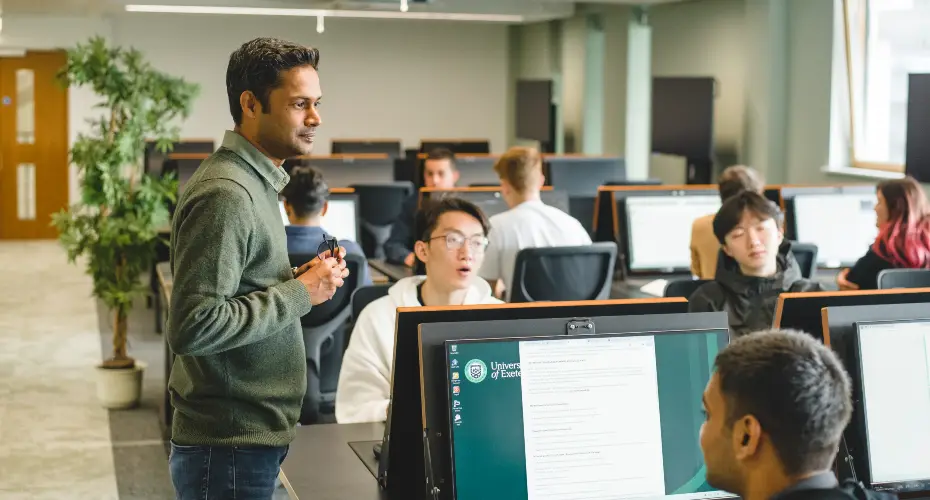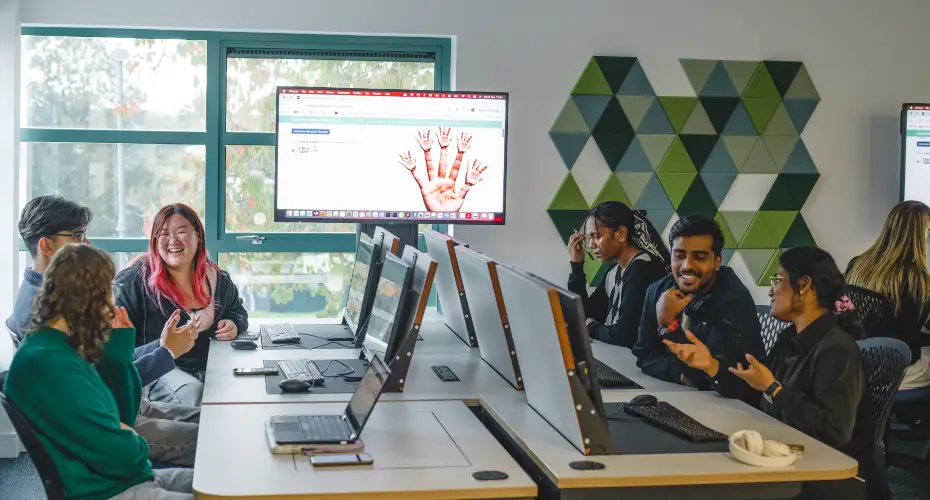| UCAS code | 1234 |
|---|---|
| Duration | 1 year full time 2 years part time |
| Entry year | 2025 |
| Campus | Streatham Campus |
| Discipline | Computer Science |
| Contact | Web: Enquire online |
| Typical offer | 2:1 Honours degree |
|---|---|
Overview
- MSc Advanced Computer Science is an ideal course for you if you have graduated from a computer science background* and wish to build on your existing knowledge of computer science whilst learning to apply your skills to complex contemporary problems across the breadth of society.
- Our flexible programme gives you the choice to advance your study in traditional computer science skills alongside exploring newer fields such as artificial intelligence and machine learning.
- A business-linked, research-led programme which focusses on the latest techniques and technologies.
- Taught by leading academics in the fields of artificial intelligence, machine learning, data science, high performance computing and networks, and cyber-security.
- You will be immersed in a community of researchers working at the forefront of modern technological developments, with excellent facilities spanning a wide range of machine types and software ecosystems.
- You will have the opportunity to carry out work on the University’s High Performance Computing environment, a £3m investment by the University, designed to serve advanced computing requirements.
- Our latest facilities for computer science students are world-class spacious teaching labs allowing comfortable, collaborative working in a sensory-friendly environment fully supported by your teachers.
*If you are interested in an MSc in computer science but do not meet the entry requirements for this programme, you are welcome to apply for MSc Computer Science.
Fast Track (current Exeter students)
Discover MSc Advanced Computer Science at the University of Exeter.
![]()
Top 10 in the UK for graduate prospects
Joint 9th for graduate prospects for Computer Science in the Complete University Guide 2025 (94%)
![]()
Long-established partnership with the Alan Turing Institute and home to the Institute of Data Science and Artificial Intelligence
![]()
Excellent facilities spanning a wide range of machine types and software ecosystems alongside world-class computer science labs
![]()
Courses designed to launch and develop careers for those working in or entering data and technology-driven roles
![]()
Top 10 in the UK for graduate prospects
Joint 9th for graduate prospects for Computer Science in the Complete University Guide 2025 (94%)
![]()
Long-established partnership with the Alan Turing Institute and home to the Institute of Data Science and Artificial Intelligence
![]()
Excellent facilities spanning a wide range of machine types and software ecosystems alongside world-class computer science labs
![]()
Courses designed to launch and develop careers for those working in or entering data and technology-driven roles
Entry requirements
Applicants are required to have at least a 2:1 degree in computer science or a related area. This is an advanced programme and requires substantial previous knowledge of computer science (equivalent to that gained from an undergraduate degree in this area).
Applicants must be able to show evidence of good programming ability in a recognised modern computer language. Applicants may be interviewed by video conference to assess their programming ability and suitability for the course.
We may consider applications with non-standard qualifications where there is evidence of exceptional performance in modules relevant to the programme of study, significant relevant work experience, or relevant professional qualifications. If you do not meet the entry criteria for this programme, please consider our MSc Computer Science programme which is open to students from non-computing backgrounds.
Please also see our guidance on essential documentation required for an initial decision on taught programme applications.
Entry requirements for international students
English language requirements
International students need to show they have the required level of English language to study this course. The required test scores for this course fall under Profile B3. Please visit our English language requirements page to view the required test scores and equivalencies from your country.
In terms of the course, MSc Advanced Computer Science focuses a lot on data processing and machine learning—both of which were exactly what I was interested in. What’s great is that the workload isn’t too intense, so I had enough time to work on my own research projects, where I spent a lot of my time.
Now, I’m still here at Exeter working on my PhD.
Exeter is an amazing place to study. It’s peaceful, friendly, and gives you the space you need to really focus on your work.
Jinming
Studied MSc Advanced Computer Science at the University of Exeter
Course content
Computer Science is a wonderful, complex and curiosity-driven scientific field in its own right, but it enables, facilitates and supports so many other fields of scientific inquiry and is applied to so many real-world problems that it affords you the opportunity to take your research or career almost anywhere.
Computing is ubiquitous in society and the fields in which we hold our expertise such as cyber security, computer vision, urban and environmental data science and evolutionary computing are filled with promise to benefit society.
This programme is research-led. More than 94% of our Computer Science research outputs are internationally excellent. Students have the opportunity to carry out work on the University’s High Performance Computing environment which represents a £3m investment by the University, designed to serve the advanced computing requirements. The opportunity to study such a societally-relevant subject in a beautiful part of the United Kingdom is a unique combination.
Our course design offers you the flexibility to choose the modules that match your areas of interest. Whether you are looking to develop fundamental computer science skills such as high performance computing or optimisation; investigate newer fields such as artificial intelligence or machine learning; or explore a combination of both, you will be able to design your own course to suit.
Your research project will be completed under the supervision of a computer science academic. Our academics have connections with industrial partners such as the National Trust, Met Office and the NHS which means there are opportunities for your research project to be linked to industry. Whatever you choose to research, the size and diversity of our department means that you will be able to choose an academic supervisor closely aligned with your research goals.
The modules we outline here provide examples of what you can expect to learn on this degree course based on recent academic teaching. The precise modules available to you in future years may vary depending on staff availability and research interests, new topics of study, timetabling and student demand.
Compulsory modules
| Code | Module | Credits |
|---|---|---|
| COMM514 | Research Project | 60 |
Optional modules
| Code | Module | Credits |
|---|---|---|
| Select 120 credits: | ||
| ECMM409 | Nature-Inspired Computation | 15 |
| ECMM410 | Research Methodology | 15 |
| COMM039 | Network Science | 15 |
| ECMM423 | Evolutionary Computation & Optimisation | 15 |
| ECMM424 | Computer Modelling and Simulation | 15 |
| ECMM426 | Computer Vision | 15 |
| COMM040 | Text Mining and Natural Language Processing | 15 |
| COMM113 | Deep Learning | 15 |
| ECMM461 | High Performance Computing | 15 |
| COMM510 | Multi-Objective Optimisation and Decision Making | 15 |
| ECM34XX | ECM34xx modules in Computer Science upto 30 credits | 30 |
| ECMM7XX | M-level modules in Mathematics | 15 |
| ECMM462 | Fundamentals of Security | 15 |
| SOCM033 | Data Governance and Ethics | 15 |
| COMM515 | Digital Twins and Simulation | 15 |
| BEMM190 | Digital Transformation | 15 |
Fees
2025/26 entry
UK fees per year:
£12,600 full-time; £6,300 part-time
International fees per year:
£29,500 full-time; £14,750 part-time
Scholarships
The University of Exeter has many different scholarships available to support your education, including £5 million in scholarships for international students applying to study with us in the 2025/26 academic year, such as our Exeter Excellence Scholarships*.
For more information on scholarships and other financial support, please visit our scholarships and bursaries page.
*Terms and conditions apply. See online for details.
Teaching and research
Teaching
Teaching is mainly delivered by lectures, workshops and online materials. Each module references core and supplementary texts, or material recommended by module deliverers, which provide in depth coverage of the subject and go beyond the lectures.
Internationally recognised research
We believe every student benefits from being taught by experts active in research and practice. All our academic staff are active in internationally-recognised scientific research across a wide range of topics. You will discuss the very latest ideas, research discoveries and new technologies, becoming actively involved in a research project yourself. Read more about our current computer science research. The University is also home to the Institute for Data Science and Artificial Intelligence which provides a hub for data-intensive science and artificial intelligence within the University and the wider region.
Academic partners
Our long-established partnership with the Alan Turing Institute, the UK’s national institute for data science and artificial intelligence, means that we have strong connections to the UK AI research community. Currently we host 11 Turing Fellows and one Turing AI Fellow at the University. Turing Fellows are established scholars with proven research excellence in data science, AI, or a related field. Lectures, conferences and seminars organised by Turing and the Turing University Network are usually open to our students to attend either in person or online.
Supportive environment
We aim to provide a supportive environment where students and staff work together in an informal and friendly atmosphere. We operate an open-door policy, so it’s easy to consult individual members of staff or to fix appointments with them via email. As a friendly group of staff, you’ll get to know us well during your time here.
Assessments
The assessment strategy for each module is explicitly stated in the full module descriptions given to students. Group and team skills are addressed within modules dealing with specialist and advanced skills. Assessment methods include essays, closed book tests, exercises in problem-solving, use of the web for tool-based analysis and investigation, mini-projects, extended essays on specialised topics, and individual and group presentations.
Academic support
This is a business-linked, research-led programme. Teaching staff are scientists and leading academics in the field who work with businesses to solve difficult, real-world computational problems. The University also has a growing number of apprenticeship programmes whose direct links with industry benefit the department.
Facilities
World-class facilities
Our latest computing facilities are world-class spacious teaching labs allowing comfortable, collaborative working in a sensory-friendly environment.
You will have the opportunity to carry out work on the University’s High Performance Computing environment, a £3m investment by the University, designed to serve advanced computing requirements.








Careers

Computer Science is at the forefront of technology and innovation. With connectivity at the heart of society, there is an increasing need for graduates who are able to understand the latest techniques and technology to negotiate problems. Huge opportunities exist for the businesses and individuals who can solve these problems using the latest technology such as artificial intelligence, machine learning, data science, high performing computing and cyber security.
Graduate destinations
Career opportunities are limitless, with graduates being found in a variety of sectors, including software engineering, health communications, education, life sciences, finance and manufacturing. This programme is particularly suited to professionals and graduates looking to develop career options or pursue academia.
Dedicated careers support
You will receive support from our dedicated Career Zone team, who provide excellent career guidance at all stages of career planning. The Career Zone provides one-on-one support and is home to a wealth of business and industry contacts. Additionally, they host useful training events, workshops and lectures which are designed to further support you in developing your enterprise acumen. Please visit the Career Zone for additional information on their services.











